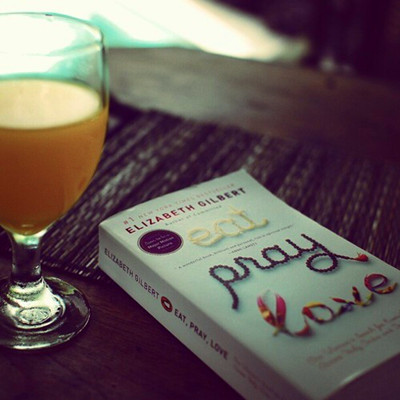
I know this feeling all too intimately. I know the sad longing to delay the end of another February 4. This sadness is one of the great trials of the human experiment. As far as we know, we are the only species on the planet who have been given the gift—or curse, perhaps—of awareness about our own mortality. Everything here eventually dies; we're just the lucky ones who get to think about this fact every day. How are you going to cope with this information? When I was nine, I couldn't do a thing with it except cry. Later, over the years, my hypersensitive awareness of time's speed led me to push myself to experience life at a maximum pace. If I were going to have such a short visit on earth, I had to do everything possible to experience it now. Hence all the traveling, all the romances, all the ambition, all the pasta. My sister had a friend who used to think that Catherine had two or three younger sisters, because she was always hearing stories about the sister who was in Africa, the sister who was working on a ranch in Wyoming, the sister who was the bartender in New York, the sister who was writing a book, the sister who was getting married—surely this could not all be the same person? Indeed, if I could have split myself into many Liz Gilberts, I would willingly have done so, in order to not miss a moment of life. What am I saying? I did split myself into many Liz Gilberts, all of whom simultaneously collapsed in exhaustion on a bathroom floor in the suburbs one night, somewhere around the age of thirty.
我太清楚這種感受了。我深知這種延后又一個二月四號的結束的悲哀渴望。這種悲傷,是人類的一個極不幸的試驗。就我們所知,人類是地球上唯一有死亡意識的生物,這是一種天賦,或一種詛咒。地球上的一切終歸死亡;我們只不過有幸天天想起這一事實。你該如何處理這個信息?九歲的我,除了哭泣之外,別無他法。此后許多年,超敏感的光陰意識使我不禁想以最快的步伐體驗人生。如果我在地球上的時間如此之短,現在就得盡力體驗。因此,我盡力旅行,盡力談情說愛,野心勃勃,大吃面食。我姐姐凱瑟琳有個朋友,經常以為她有兩三個妹妹,因為老是聽說在非洲的妹妹、在懷俄明牧場工作的妹妹、在紐約干酒保的妹妹、寫書的妹妹、即將出嫁的妹妹——這不可能是同一個人吧?是啊,假若能把自己分裂成好幾個小莉?吉爾伯特,我很樂意,以免錯失人生的任何時刻。我在說什么呀?我確實早已把自己分裂成許多個小莉·吉爾伯特,她們在三十歲左右的某個晚上,同時筋疲力盡地倒在市郊的浴室地板上。
I should say here that I'm aware not everyone goes through this kind of metaphysical crisis. Some of us are hardwired for anxiety about mortality, while some of us just seem more comfortable with the whole deal. You meet lots of apathetic people in this world, of course, but you also meet some people who seem to be able to gracefully accept the terms upon which the universe operates and who genuinely don't seem troubled by its paradoxes and in-justices. I have a friend whose grandmother used to tell her, "There's no trouble in this world so serious that it can't be cured with a hot bath, a glass of whiskey and the Book of Common Prayer." For some people, that's truly enough. For others, more drastic measures are required.
And now I will mention my friend the dairy farmer from Ireland—on the surface, a most unlikely character to meet in an Indian Ashram. But Sean is one of those people like me who were born with the itch, the mad and relentless urge to understand the workings of existence. His little parish in County Cork didn't seem to have any of these answers, so he left the farm in the 1980s to go traveling through India, looking for inner peace through Yoga. A few years later, he returned home to the dairy farm in Ireland. He was sitting in the kitchen of the old stone house with his father—a lifelong farmer and a man of few words—and Sean was telling him all about his spiritual discoveries in the exotic East. Sean's father listened with mild interest, watching the fire in the hearth, smoking his pipe. He didn't speak at all until Sean said, "Da—this meditation stuff, it's crucial for teaching serenity. It can really save your life. It teaches you how to quiet your mind."
His father turned to him and said kindly, "I have a quiet mind already, son," then resumed his gaze on the fire.
But I don't. Nor does Sean. Many of us don't. Many of us look into the fire and see only inferno. I need to actively learn how to do what Sean's father, it seems, was born knowing—how to, as Walt Whitman once wrote, stand "apart from the pulling and hauling . . . amused, complacent, compassionating, idle, unitary . . . both in and out of the game and watching and wondering at it all." Instead of being amused, though, I'm only anxious. Instead of watching, I'm always probing and interfering. The other day in prayer I said to God, "Look—I understand that an unexamined life is not worth living, but do you think I could someday have an unexamined lunch?"











